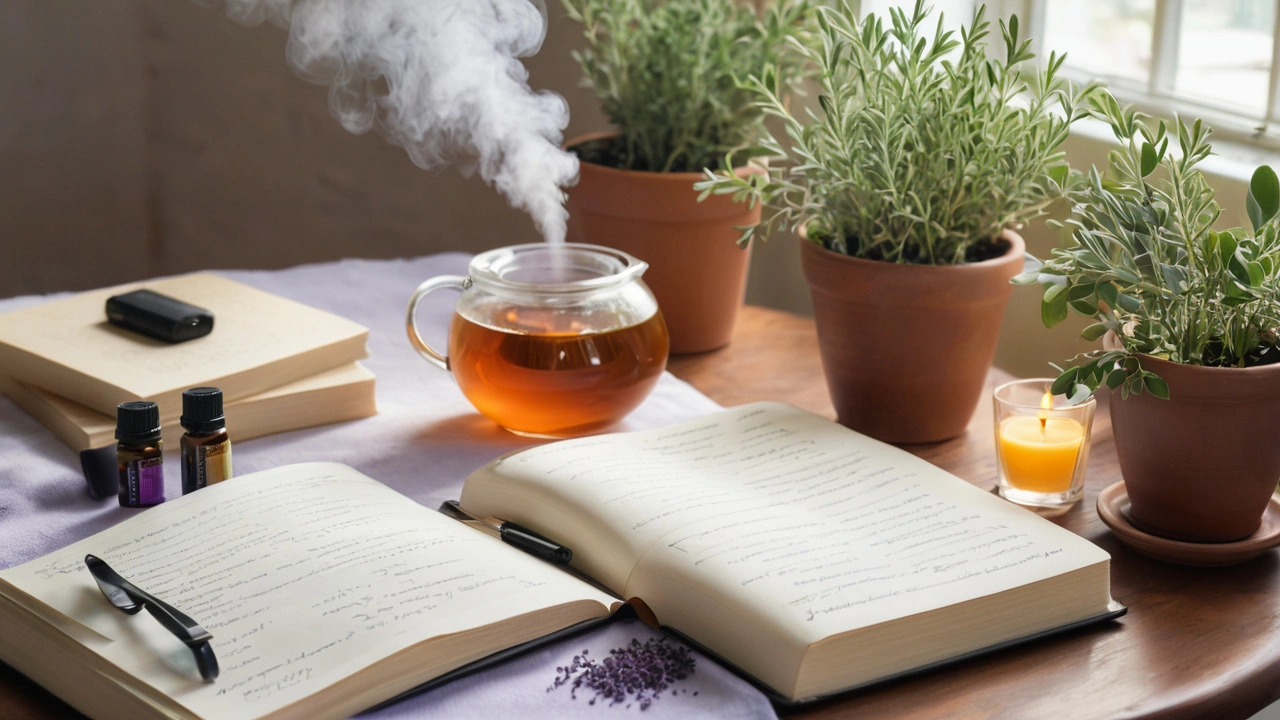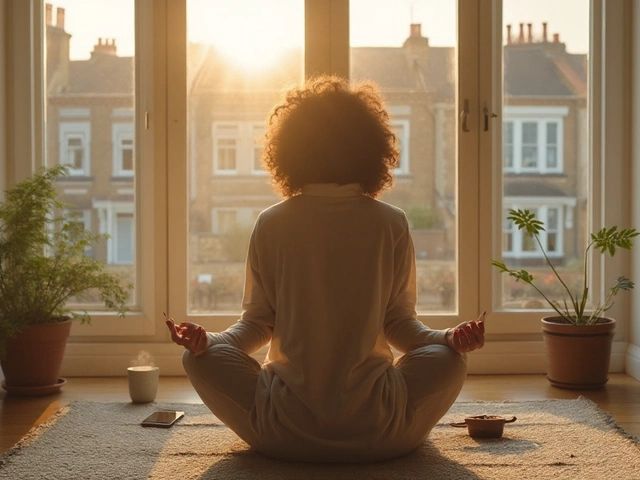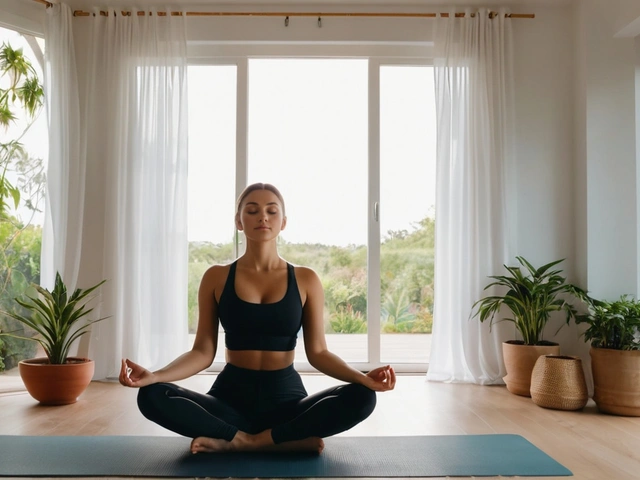Aromatherapy, often referred to as essential oil therapy, taps into the therapeutic power of natural plant extracts. This practice has been around for centuries, with ancient civilizations like the Egyptians and Greeks using aromatic oils for a variety of purposes. Today, it remains a popular complementary therapy, fitting seamlessly into a holistic approach to wellness.
The essence of aromatherapy lies in essential oils—concentrated liquids containing volatile aroma compounds. When inhaled or applied to the skin, these oils interact with the body's systems in complex ways. The aromatic molecules can influence brain chemistry and affect mood, stress levels, and overall well-being.
What sets aromatherapy apart is its accessibility and versatility. With a vast array of essential oils available, each possessing unique properties, you can find a scent to suit nearly every need. Whether you aim to alleviate stress, enhance sleep, or boost your mood, there's likely an essential oil ideal for you.
- Introduction to Aromatherapy
- Types of Essential Oils
- Benefits for Mental Health
- Physical Wellness and Pain Relief
- Emotional Balance
- How to Get Started
Introduction to Aromatherapy
Aromatherapy is an alternative healing practice that employs the use of essential oils derived from plants to promote physical and emotional well-being. This practice has roots that trace back to ancient civilizations, where it was commonly used in medicinal and religious contexts. Today, it has gained popularity as a holistic wellness approach, providing a non-invasive method for addressing various ailments and enhancing well-being.
Essential oils are extracted from different parts of plants, including flowers, leaves, bark, and roots. These oils contain the plant's essence and are typically obtained through methods such as steam distillation or cold pressing. Once extracted, they can be used in a variety of ways, including inhalation, topical application, and even diffusion in the air.
An interesting fact about essential oils is that their aromatic compounds can interact with the limbic system in the brain. This part of the brain is associated with memory, emotions, and behaviors, which explains why certain scents can evoke strong emotional responses. For instance, the smell of lavender is often linked with relaxation and calmness, while peppermint can be invigorating and energizing.
The efficacy of aromatherapy isn’t just anecdotally supported; scientific research has also explored its benefits. Studies have shown that aromatherapy can reduce stress, improve mood, and even enhance cognitive function. For example, a study published in the journal 'Evidence-Based Complementary and Alternative Medicine' found that inhaling lavender essential oil significantly reduced anxiety levels in participants.
"Aromatherapy can be a powerful tool in managing stress and enhancing quality of life," says Dr. Jane Buckle, an expert in clinical aromatherapy. "Its effects are well-documented, particularly in reducing anxiety and promoting relaxation."
Given its wide range of applications and benefits, aromatherapy has become a common feature in wellness practices, from spa treatments to home rituals. While its roots are ancient, modern technology and research have only enhanced our understanding of this fascinating field. With the right guidance and a bit of experimentation, anyone can incorporate aromatherapy into their self-care routine, reaping the multiple benefits it offers.
Types of Essential Oils
When it comes to aromatherapy, the array of essential oils available can feel overwhelming. But don’t worry; understanding the basics can help you make informed choices. Essential oils are derived from various parts of plants, including flowers, leaves, bark, and roots. Each oil has its unique scent and properties, catering to different needs and preferences.
One of the most well-known essential oils is lavender. Known for its calming effects, lavender oil can help reduce anxiety and improve sleep quality. It’s a staple in many households for its versatile uses. Research has shown that lavender can lower stress levels by influencing the parasympathetic nervous system, which helps the body relax.
Eucalyptus oil is another popular choice, particularly for respiratory issues. Its strong, minty aroma helps clear congestion and can even act as an effective anti-inflammatory. Eucalyptus oil is widely used in products designed to relieve colds and flu symptoms. A 2010 study found that its main component, eucalyptol, has notable antimicrobial effects.
For those looking to boost their mood and energy, citrus oils like lemon, orange, and grapefruit are excellent options. These oils are extracted from the peel of the fruits and are known for their invigorating and uplifting scents. Research shows that inhaling citrus scents can reduce stress hormones and increase feelings of happiness.
Peppermint oil has a refreshing scent and is often used to alleviate headaches and mental fatigue. Its invigorating aroma can stimulate the mind and improve concentration. Studies have demonstrated peppermint oil's effectiveness in relieving tension headaches and improving cognitive functions.
Tea tree oil is celebrated for its antibacterial and antiviral properties. Extracted from the leaves of the Melaleuca tree, it's often used in skin care for treating acne and fungal infections. Clinical studies have affirmed tea tree oil's efficacy as an antimicrobial agent, making it a valuable addition to any first-aid kit.
Another valuable oil is chamomile. Known for its soothing properties, chamomile oil can help alleviate stress and promote sleep. It's also beneficial for skin inflammations and irritations. Historical records show that chamomile was used by the Romans for its calming effects and as a healing remedy in various treatments.
Blending Essential Oils
Many enthusiasts blend different oils to create personalized aromatic experiences. For instance, combining lavender and chamomile can enhance relaxation, while a mix of eucalyptus and peppermint can clear nasal passages and boost alertness. Blending oils is both an art and science, where the goal is to create harmonizing scents that amplify the beneficial properties of each oil involved.Incorporating essential oils can be a journey of discovery. Pay attention to your body's responses and consider keeping a journal to note down effects, preferences, and combinations that work best for you. With time, you'll find which scents resonate most and how to best integrate them into your wellness routine.
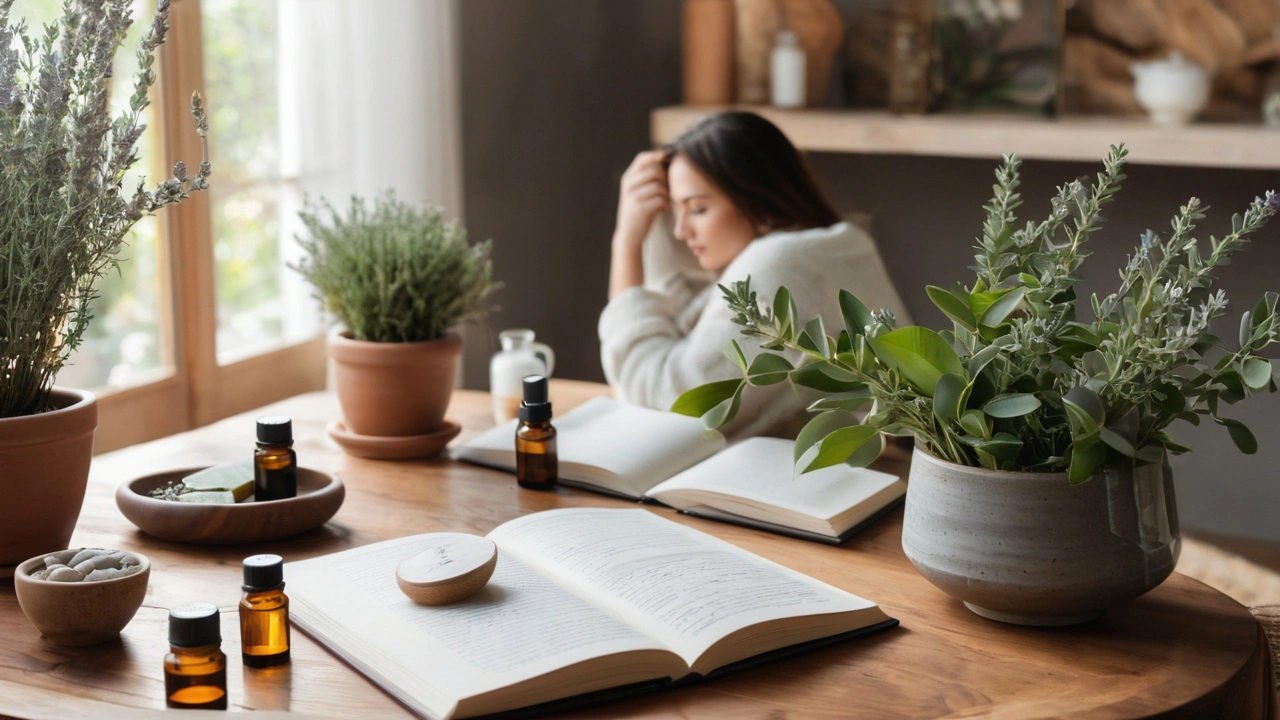
Benefits for Mental Health
Aromatherapy has a remarkable impact on mental health, offering various ways to improve mood, reduce anxiety, and support emotional well-being. One of the primary mechanisms is through the olfactory system. When you inhale essential oils, the aroma molecules travel straight to the brain, particularly affecting the limbic system, which is responsible for emotions, behavior, and long-term memory.
One of the most popular essential oils for mental health is lavender. Known for its calming properties, lavender can help reduce stress and anxiety. Research has shown that lavender oil can lower cortisol levels, the stress hormone, which is highly beneficial for individuals experiencing chronic stress. It is often used in diffusers or added to bathwater for a soothing experience.
Citing a study from the Journal of Alternative and Complementary Medicine, "Inhalation of lavender essential oil during office breaks significantly lowered anxiety and improved work performance."
Another valuable essential oil is bergamot. Often used in aromatherapy for stress relief, bergamot has been found to reduce saliva cortisol levels and improve mood. Its citrusy scent is invigorating yet calming, making it an excellent choice for combating depression and anxiety. Many people use it in essential oil blends or as part of a massage therapy routine.
For those dealing with insomnia or other sleep disorders, aromatherapy offers assistance through essential oils like chamomile and valerian. These oils have sedative properties that can enhance relaxation and promote better sleep quality. In turn, improved sleep significantly contributes to better mental health by allowing the brain to rest and rejuvenate.
Incorporating aromatherapy into your daily routine doesn't have to be complicated. Simple practices like inhaling essential oils directly, using an essential oil diffuser, or even adding a few drops to your pillow can make a noticeable difference. These methods can create a more calming environment, aiding in the reduction of anxiety and the promotion of relaxation.
An interesting fact is that specific essential oils can even boost cognitive function. For instance, rosemary and peppermint oils are believed to enhance focus and memory. Students and professionals might find these oils helpful when needing to concentrate or memorize information for extended periods. Adding a few drops to a diffuser during study or work sessions can provide a natural mental boost.
It's important to use essential oils safely. Always opt for pure, high-quality oils and avoid synthetic fragrances, which do not offer the same therapeutic benefits. Conducting a patch test before using a new essential oil topically can prevent any allergic reactions.
Physical Wellness and Pain Relief
When it comes to physical wellness, aromatherapy offers a natural approach to pain relief and overall comfort. Essential oils can be a gentle yet effective alternative to conventional painkillers, and they come with fewer side effects. These oils can be used to address various forms of discomfort, from headaches and migraines to muscle strains and joint pain.
Certain essential oils are particularly known for their analgesic and anti-inflammatory properties. For example, lavender oil is widely regarded for its soothing effects, often used to alleviate headaches and muscle tension. Peppermint oil, on the other hand, contains menthol, which can help relax muscles and ease pain. It's no wonder that many people apply diluted peppermint oil to their temples or neck to ward off persistent headaches.
Another popular choice for pain relief is eucalyptus oil. This oil possesses compounds known to reduce inflammation and improve blood flow, which are essential in the recovery of aching joints and muscles. A simple way to benefit from eucalyptus oil is by adding a few drops to a warm bath or using it in a compress to target sore areas.
According to a study published in the Journal of Clinical Nursing, patients who used lavender oil experienced a significant reduction in pain severity after undergoing certain medical procedures.
"Aromatherapy using essential oils can be an excellent complementary treatment for pain management," said Dr. Jane Buckle, a leading expert in the field.
In terms of delivery methods, there are several ways to incorporate aromatherapy into your pain relief routine. One common method is through massage, where essential oils are mixed with carrier oils like almond or jojoba oil and massaged into the skin. This not only helps the body absorb the oil but also provides the added benefit of massage therapy in soothing tight muscles.
Another effective method is through inhalation. Using a diffuser to disperse essential oils in your living space can create an environment that supports your physical well-being. Inhalation allows the active compounds in the oils to enter the bloodstream via the lungs, delivering their therapeutic benefits quickly and effectively.
For those who prefer targeted application, roll-on bottles filled with diluted essential oils can be a convenient option. These are easy to carry and can be applied directly to sore spots, such as wrists, temples, or the back of the neck, providing on-the-go relief.
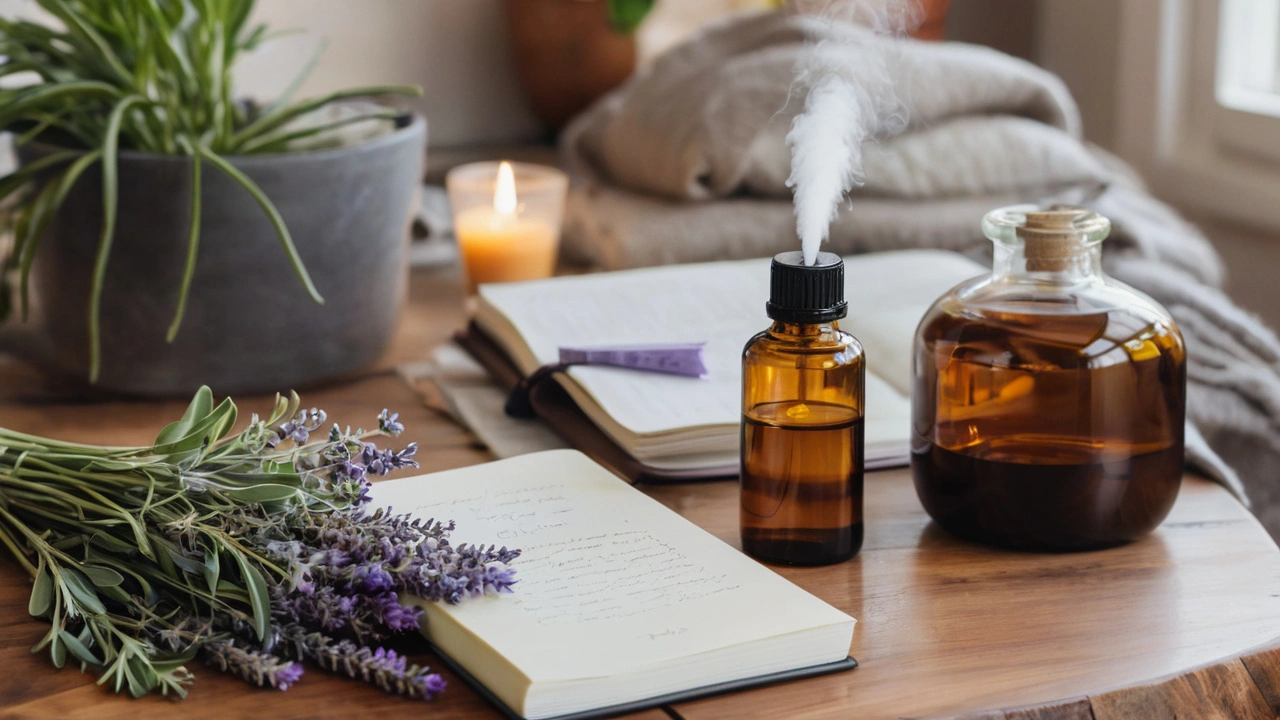
Emotional Balance
In life’s hustle and bustle, our emotional well-being often takes a back seat. The stresses of modern life, whether from work, family, or societal pressures, can throw our emotional balance off-kilter. Aromatherapy offers a gentle, non-invasive way to restore this balance. By engaging our sense of smell, essential oils can directly influence our brain’s limbic system, which controls emotions and memories.
Research has shown that certain essential oils have mood-enhancing properties. Lavender oil, for example, is well-known for its calming effects. Studies have demonstrated that inhaling lavender can reduce anxiety and elevate mood. Bergamot, another popular choice, has been shown to lessen symptoms of depression and stress. Using these oils in a diffuser, or adding a few drops to a warm bath, can create a serene environment that promotes relaxation.
It’s fascinating how scents can trigger emotional responses. Rose oil, with its rich and intoxicating aroma, is often linked with feelings of love and joy. When feeling down or disconnected, just a few whiffs of rose oil can uplift your spirits and foster a sense of contentment. Similarly, citrus oils like lemon and orange are invigorating and can help combat fatigue and sadness.
Research from the National Institutes of Health has found that “aromatherapy can significantly reduce depressive symptoms and improve mood.” (NIH, 2021)
Integrating aromatherapy into daily routines can be quite simple. Creating a ritual around it can enhance its effectiveness. For example, starting and ending the day with a brief aromatherapy session can set positive intentions for the day and promote restful sleep at night. Inhaling essential oils during meditation or yoga can also deepen these practices, aligning the mind and body.
Aromatherapy can also provide support during emotionally challenging times. Grief, for instance, is an emotion that everyone experiences uniquely. Essential oils like frankincense and sandalwood offer grounding properties that can help individuals process grief more smoothly. They soothe the mind, allowing a person to navigate through complex emotions with greater clarity.
Another vital aspect of emotional balance is self-empowerment. Essential oil blends can be personalized, giving you a sense of control over your well-being. Combining oils like ylang-ylang and patchouli can create a blend that not only smells delightful but also promotes self-confidence and emotional stability.
Creating a soothing environment at home can be as simple as using an oil diffuser. Combining different oils can craft a custom atmosphere tailored to your emotional needs. Imagine a blend of lavender, chamomile, and sandalwood wafting through your living room as you unwind after a long day. It creates a sanctuary, a personal space where you feel safe and nurtured.
Aromatherapy is unique in its ability to bring about emotional balance because it engages multiple senses simultaneously. It’s not just about the aroma; it’s also about the tactile experience of applying oils, the visual beauty of a well-maintained diffuser, and even the subtle sounds associated with their use. These combined sensory inputs can create a powerful response, helping you feel more centered and emotionally balanced.
How to Get Started
Diving into aromatherapy may seem daunting, but with a bit of guidance, you can easily incorporate this ancient practice into your daily life. Here are some steps to help you get started on your holistic wellness journey through aromatherapy.
Choosing Your Essential Oils
The first step is selecting the right essential oils. With so many options available, it can be overwhelming. A good starting point is to choose oils based on your specific needs. If you're looking to reduce stress, lavender is an excellent choice. If you need a mood booster, try citrus oils like orange or lemon. For better sleep, chamomile or bergamot might be ideal options. Make sure to purchase your oils from a reputable source to ensure they are pure and free from additives.
Methods of Use
Once you have your essential oils, it's important to know how to use them properly. There are several methods to incorporate them into your routine:
- Diffusion: Use an essential oil diffuser to spread the aroma throughout a room. This method is great for creating a calming atmosphere.
- Topical Application: Some oils can be applied directly to the skin, but they often need to be diluted with a carrier oil like coconut or jojoba oil.
- Inhalation: Simply inhale the aroma directly from the bottle or add a few drops to a handkerchief or cotton ball.
- Baths: Adding a few drops of essential oil to your bath can enhance relaxation.
- Massage: Incorporate essential oils into your massage for a more soothing experience.
Always perform a patch test when applying essential oils topically to ensure you don't have an allergic reaction.
Integrating into Daily Life
Consistency is key when using aromatherapy for holistic wellness. Try to integrate it into your daily regimen. For instance, start your day with invigorating scents like peppermint or eucalyptus to promote alertness. In the evening, unwind with calming scents like lavender or ylang-ylang to prepare for a good night's sleep. Additionally, consider setting specific times during your day for aromatherapy, making it a ritual you look forward to.
"Aromatherapy can be a vital part of a self-care routine, offering benefits for both mental and physical health," says Dr. Jane Buckle, a leading expert in the field.
Storing Your Oils
Proper storage is essential to maintain the efficacy of your essential oils. Keep them in a cool, dark place away from sunlight and heat. Store oils in dark glass bottles to protect them from light degradation. Always keep the bottles tightly sealed to prevent oxidation. Following these steps will ensure your oils remain potent for a long time.
Safety First
While aromatherapy is generally considered safe, it is crucial always to follow safety guidelines. Some essential oils are not suitable for children, pregnant women, or individuals with specific health conditions. Always consult with a healthcare provider if you are unsure. Be cautious about using oils around pets, as some can be harmful to animals. Remember, less is more; essential oils are highly concentrated, so only a few drops are needed.
Getting started with aromatherapy is an exciting journey toward better mental, physical, and emotional wellness. Start small, experiment, and find what works best for you. With consistency and care, aromatherapy can become a rewarding part of your holistic wellness routine.

